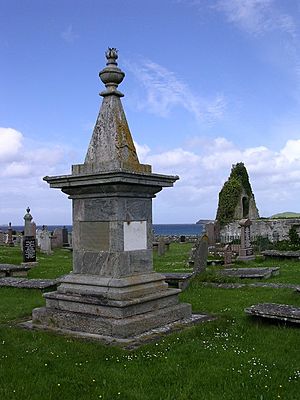Rob Donn facts for kids
Rob Donn (which means "Brown-haired Rob") lived from 1714 to 1778. He was a famous Scottish Gaelic poet from a part of Scotland called Sutherland. Most people believe his full name was Robert Mackay, but some disagree. So, he is often known simply as Rob Donn.
Contents
Biography
Early Life and Talents
Rob Donn was born in a place called Allt na Caillich in Strathmore, Sutherland. His father, Donald Donn, was a small farmer. Even though there's some debate about his family name, everyone in the Highlands knew him as Rob Donn.
From a young age, Rob Donn was known for being very clever and witty. When he was about seven or eight, he started working for John Mackay of Musal. John was a local cattle drover, someone who moved groups of cattle from one place to another.
Rob Donn never learned to read or write, and he never spoke English. However, he was greatly inspired by the poems of Alexander Pope. He heard these poems translated into Gaelic by the local Church of Scotland minister, the Rev. Murdo MacDonald.
Poetry and Politics
Rob Donn lived during a time of big changes in Scotland, including three Jacobite Rebellions. These were times when people tried to bring back the old royal family to the throne. The rebellions happened in 1715 (when he was just a baby), 1719, and 1745.
His talent for poetry was noticed early by Iain MacEachainn MacAoidh. Iain was a Clan Mackay tacksman (a kind of land manager) from Strathmore. Iain became Rob Donn's patron, supporting the former cattle drover. They were good friends who enjoyed hunting and poetry together.
During the Jacobite rising of 1745, the Clan Mackay supported the House of Hanover (the ruling British royal family). Even so, after the Jacobite clans were defeated at the Battle of Culloden in 1746, the Mackays also faced harsh rules. One of these was the Dress Act 1746, which banned traditional Highland clothing. Rob Donn wrote a powerful poem called Òran Nan Casagan Dubha ("The Song of the Black Cassocks"). In it, he showed his anger about the ban and made fun of the Lowland clothes people were forced to wear. He felt the Act was so insulting that he even suggested the Clan Mackay should switch their support from King George II to Prince Charles Edward Stuart.
Later Life and Work
When Rob Donn's patron, Iain Mac Eachainn, passed away in 1757, Rob Donn wrote a special poem praising him. This was usually done only for very important people like nobles. Rob Donn's poem was unique because he praised Iain Mac Eachainn by also pointing out the flaws of other wealthy people. He showed Iain as someone who shared his wealth with those in need, making the poem a valuable look at society at that time.
In 1759, Rob Donn joined the Sutherland Fencibles, a local military group, during the Seven Years' War. After the war ended in 1763, he started working for Donald Mackay, the 4th Lord Reay, as a cattleman. However, Rob Donn thought that threshing (separating grain from stalks) the corn for the cattle was beneath him. He hired someone else to do it. This upset the estate Factor (the person who managed the estate), and Rob Donn was fired.
After being dismissed, Rob Donn lived in Auchmore and Sango until 1770. Then, Colonel Hugh Mackay, Iain Mac Eachainn's son, became the estate factor for Lord Reay. He brought Rob Donn back to work for the Chief. Rob Donn stayed on the Chief's estate until he passed away in 1778. Both Lord Reay and Rev. Murdo MacDonald were very important to Rob Donn and were often praised in his poems.
How His Poems Were Saved
Many of Rob Donn's poems were saved thanks to the Rev. John Thomson. He took over from Murdo MacDonald as the minister in Durness. Rev. Thomson allowed his daughter to write down Rob Donn's poems exactly as he spoke them, without changing anything.
Later on, some people who collected and edited his poems were not always as careful. For example, Rob Donn spoke a special dialect (a local way of speaking) from Strathnaver. Sometimes, this was changed to a more common form of Scottish Gaelic. This meant that some of the original feeling and rhythm of his poems were lost.
 | Leon Lynch |
 | Milton P. Webster |
 | Ferdinand Smith |


